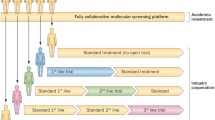Abstract
Phase I, II, and III clinical studies govern the progression of a new agent, or regimen, towards its incorporation into clinical practice. The characteristics of most recent anticancer agents, i.e., molecularly targeted drugs and immune therapies, as compared to cytotoxic chemotherapy, are driving an evolution of the format of such studies, with an increasing overlap of classical study phases and transformation of end-points. This parallels an ongoing evolution of the methodology of clinical research in the era of precision medicine, driven by molecular biology, and personalized medicine, driven by the attempt to individually tailor the patient-physician shared clinical decision-making process. Clinical studies in small populations, as determined by disease partitioning of precision medicine or inherently found in rare cancers, are in need of steps forward in terms of research methodology. Meanwhile, artificial intelligence tools are currently entering clinical medicine, with the potential of emulating clinical skills, but also with the ability of machine learning to treat big data, from omics-based to real-world clinical data. At the moment, how artificial intelligence tools might interact with the classical instruments of clinical research is unclear. In any case, the whole body of evidence provided throughout the development of a new agent is used for its risk/benefit assessment by regulatory bodies governing new medicine approval and, in European systems, for cost/effectiveness health technology assessment by reimbursement bodies. Following this, there is always room for studying further the positioning of any agent, or regimen, in the clinic, hopefully with the academia as a driver. Even when it may be pathologically “agnostic” for regulatory purposes, new anticancer drug development should always be seen in the context of the advancement of cancer treatment as a whole under a multidisciplinary perspective.
Access this chapter
Tax calculation will be finalised at checkout
Purchases are for personal use only
Similar content being viewed by others
References
European Partnership Action Against Cancer Consensus Group, Borras JM, Albreht T, Audisio R, Briers E, Casali P, Esperou H, et al. Policy statement on multidisciplinary cancer care. Eur J Cancer. 2014;50:475–80.
Ciardiello F, Arnold D, Casali PG, Cervantes A, Douillard JY, Eggermont A, et al. Delivering precision medicine in oncology today and in future-the promise and challenges of personalised cancer medicine: a position paper by the European Society for Medical Oncology (ESMO). Ann Oncol. 2014;25:1673–8.
Offin M, Liu D, Drilon A. Tumor-agnostic drug development. Am Soc Clin Oncol Educ Book. 2018;38:184–7.
Streptomycin in Tuberculosis Trials Committee. Streptomycin treatment of pulmonary tuberculosis. Br Med J. 1948;2:769–82.
Evidence-Based Medicine Working Group. Evidence-based medicine. A new approach to teaching the practice of medicine. JAMA. 1992;268:2420–5.
Djulbegovic B, Guyatt GH. Progress in evidence-based medicine: a quarter century on. Lancet. 2017;390:415–23.
Cochrane AL. Effectiveness and efficiency. The Nuffield Provincial Hospitals Trust. 1972.
Khozin S, Blumenthal GM, Pazdur R. Real-world data for clinical evidence generation in oncology. J Natl Cancer Inst. 2017;109(11).
Katsnelson A. Momentum grows to make ‘personalized’ medicine more ‘precise’. Nat Med. 2013;19:249.
Greenland S, Senn SJ, Rothman KJ, Carlin JB, Poole C, Goodman SN, et al. Statistical tests, P values, confidence intervals, and power: a guide to misinterpretations. Eur J Epidemiol. 2016;31:337–50.
Mark DB, Lee KL, Harrell FE Jr. Understanding the role of P values and hypothesis tests in clinical research. JAMA Cardiol. 2016;1:1048–54.
Adamina M, Tomlinson G, Guller U. Bayesian statistics in oncology: a guide for the clinical investigator. Cancer. 2009;115:5371–81.
Gatta G, van der Zwan JM, Casali PG, Siesling S, Dei Tos AP, Kunkler I, et al.; RARECARE working group. Rare cancers are not so rare: the rare cancer burden in Europe. Eur J Cancer. 2011;47:2493–511.
Frezza AM, Trama A, Blay JY, Casali PG. Networking in rare cancers: what was done, what’s next. Eur J Surg Oncol. 2019;45:16–8.
Casali PG, Bruzzi P, Bogaerts J, Blay JY; Rare Cancers Europe (RCE) Consensus Panel. Rare Cancers Europe (RCE) methodological recommendations for clinical studies in rare cancers: a European consensus position paper. Ann Oncol. 2015;26:300–6.
Tang A, Tam R, Cadrin-Chênevert A, Guest W, Chong J, Barfett J, et al. Canadian Association of Radiologists White Paper on Artificial Intelligence in Radiology. Can Assoc Radiol J. 2018;69:120–35.
Scott IA. Machine learning and evidence-based medicine. Ann Intern Med. 2018;169:44–6.
Pignatti F, Péan E. Regulatory and evidence requirements and the changing landscape in regulation for marketing authorisation. Recent Results Cancer Res. 2019;213:169–87.
Jönsson B. Technology assessment for new oncology drugs. Clin Cancer Res. 2013;19:6–11.
Cherny N, Sullivan R, Torode J, Saar M, Eniu A. ESMO European Consortium Study on the availability, out-of-pocket costs and accessibility of antineoplastic medicines in Europe. Ann Oncol. 2016;27:1423–43.
Kredo T, Bernhardsson S, Machingaidze S, Young T, Louw Q, Ochodo E, et al. Guide to clinical practice guidelines: the current state of play. Int J Qual Health Care. 2016;28:122–8.
Campbell H, Hotchkiss R, Bradshaw N, Porteous M. Integrated care pathways. BMJ. 1998;316:133–7.
Cherny NI, Dafni U, Bogaerts J, et al. ESMO-magnitude of clinical benefit scale version 1.1. Ann Oncol. 2017;28:2340–66.
Detsky AS, Naglie G, Krahn MD, Naimark D, Redelmeier DA. Primer on medical decision analysis. Med Decis Mak. 1997;17:123–51.
Author information
Authors and Affiliations
Corresponding author
Editor information
Editors and Affiliations
Rights and permissions
Copyright information
© 2021 Springer Nature Switzerland AG
About this chapter
Cite this chapter
Casali, P.G. (2021). New Drugs Development. In: Russo, A., Peeters, M., Incorvaia, L., Rolfo, C. (eds) Practical Medical Oncology Textbook. UNIPA Springer Series. Springer, Cham. https://doi.org/10.1007/978-3-030-56051-5_18
Download citation
DOI: https://doi.org/10.1007/978-3-030-56051-5_18
Published:
Publisher Name: Springer, Cham
Print ISBN: 978-3-030-56050-8
Online ISBN: 978-3-030-56051-5
eBook Packages: MedicineMedicine (R0)




